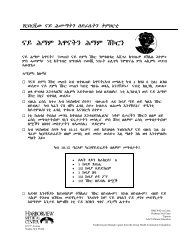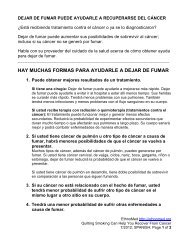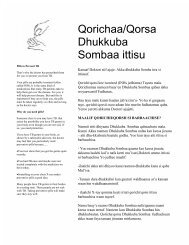Somali Knowledge Attitude Practices Study (KAPS) - EthnoMed
Somali Knowledge Attitude Practices Study (KAPS) - EthnoMed
Somali Knowledge Attitude Practices Study (KAPS) - EthnoMed
You also want an ePaper? Increase the reach of your titles
YUMPU automatically turns print PDFs into web optimized ePapers that Google loves.
health facilities were reported to be inaccessible due to distance, or inadequate and poorly<br />
equipped. The health services in the rural areas include MCH, TBA and a hospital.<br />
The management of illnesses in the urban areas tends to lean more on use of modern medicine<br />
from private health facilities, health posts and MCH than traditional and herbal medicine. In Juba<br />
and Bakool regions, for example, 60-75% of the population was reported to be using modern<br />
medicine to treat childhood illnesses. Prayers also play significant roles (25-40% of the<br />
population) in the management of illness in urban areas. Certain illnesses which require only<br />
prayer, such as convulsions, or those that can only be treated through traditional medicine, such<br />
as the Evil Eye and dysentery are only referred to health facilities when all home therapies, herbal<br />
and traditional treatments have failed to cure the disease.<br />
Diarrhoea: Several actions may be taken by caregivers in the management of diarrhoea, and<br />
children often recover from diarrhoea when the first action of treatment is taken. The<br />
management of normal diarrhoea (Shuban) is similar in almost all livelihood zones. In most<br />
communities the treatment for the disease starts with giving the child ORS to drink, followed by<br />
reciting the Koran or prayer. If the child does not get well, he is given diluted lemon juice with no<br />
sugar added as the sugar is believed to aggravate the diarrhoea. The lemon is believed to kill any<br />
disease organisms that may be causing the diarrhoea. Once the child has shown signs of<br />
improvement, the child is given plenty of other fluids (sugar water and salt, lean meat, rice water<br />
or sour milk without fat). Feeding a child with diarrhoea on unripe, boiled bananas was also<br />
reported from urban areas in Juba. In most livelihood zones, sugar is only given after the<br />
diarrhoea has stopped to boost the energy level because it is believed to aggravate the diarrhoea<br />
and cause dehydration. Feeding the child a child who has diarrhoea with milk is normally<br />
temporarily stopped. The child is instead given sour milk without fat or rice water. If the simple<br />
home health cures fail to treat the diarrhoea, the child is taken to the nearest health facility or<br />
traditional herbs may be used. Prayers, followed by use of herbal medicine and lastly going to the<br />
doctor are another option which a caregiver may choose in case of diarrhoea in a child.<br />
Reports form urban areas indicated that the use of ORS and modern medicine from private<br />
facilities or any nearest health facility in the most common way of managing diarrhoea.<br />
All forms of diarrhoea which are associated with teething are only curable by traditional healers<br />
who must perform the removal of the “fox teeth/red worm”, a practice known as “Iligow”. It is<br />
believed that the “red worm” is responsible for constant irritation in the mouth that results in<br />
diarrhoea. However, when the worm is extracted, the child gets cured. Husbands are often not<br />
aware or even consulted when the child is taken for Iligow. The procedure is done without any<br />
infection prevention measures.<br />
Dysentery: Dysentery is recognized as diarrhoea with blood and mucus in the stool, and is more<br />
common during hot seasons (“Jilaal”) from January to March. The treatment of the disease in<br />
pastoral, agro-pastoral and riverine zones involves use of ghee/fat from sheep and<br />
special/nutritious soup. Sheep fat or soups are administered first before seeking any other<br />
treatments. It is believed that the sheep is a strong animal that will not die quickly even when<br />
bitten by a snake unlike the goat or cow; hence its fat is preferred. The child is only referred to a<br />
health facility if this traditional treatment fails.<br />
Among the urban population, dysentery treatment of dysentery involves the following in addition<br />
to the sheep fat, with the health facility as the last option:<br />
1) Water Melon Juice: Drinking water-melon juice, three times per day for seven days For<br />
small children, the water-melon juice is given in a cup or feeding bottle.<br />
31






